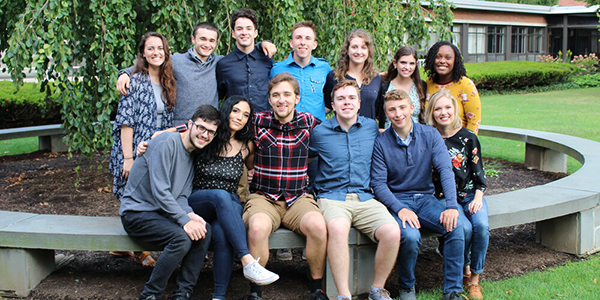Alex Leopold strives to strengthen community through service and bipartisan bridge-building

Alex Leopold, a senior double-majoring in economics and political science, has spent his college career interested in bettering his community. He started out volunteering through Note to Self, the community service a cappella group at Binghamton University, where members volunteer for local organizations and raise money for charitable causes.
Leopold joined Note to Self in fall 2017 and has been involved ever since — he currently serves as the group’s president. In addition to performing, members regularly participate in community service projects in Broome County. Last year they worked in a community garden with Volunteers Improving Neighborhood Environments (VINES). Through VINES, the group helped use sustainable agriculture to fight local food insecurity.
In fall 2020, members fundraised for Binghamton Food Rescue, a local organization that redistributes food to local families in need. According to Leopold, around 40% of U.S. food products go to waste across the supply chain. To combat this, Binghamton Food Rescue provides rescued food to individuals and organizations that would not otherwise have access to healthy and affordable food.
Furthering his commitment to strengthening communities, Leopold has recently turned his attention to building bridges between politically polarized groups in the campus community. He recently founded and serves as president of Binghamton University chapter of BridgeUSA, a nonpartisan organization that connects the political left and right on campuses through civil and moderated discussion. Leopold said that his passion to begin a chapter of this organization stemmed from some events that occurred on campus last year.
“Last year, our campus witnessed an incident where two opposing factions clashed in a way that was rhetorically and physically violent,” said Leopold. “Binghamton students provoked each other with taunts and intentionally offensive imagery and destroyed property. Beyond inflaming political and racial tensions, the confrontation showed how broken our discourse was.”
Leopold said that as the campus and nation have shown signs of a hyperpartisan, hyperpolarized climate recently, BridgeUSA wants to develop the next generation of engaged, informed and constructive citizens. Their movement catalyzes the passion of the next generation to invest in the future of democracy.
“In response, I started the chapter to build a platform of basic understanding across the aisle,” Leopold said. “The goal is not for participants to agree about policy but to understand the moral values that drive the other side — and that drive themselves — and how those values underpin their political views. BridgeUSA’s purpose is not to create centrists but to recover the crucial bipartisanship necessary to grassroots cooperation and good governance.”
According to Leopold, these problems stem from the lack of understanding between recent generations. Without a true effort to understand the drivers and goals of opposing positions, the problems that the nation faces cannot be solved.
“I believe that understanding starts with us,” Leopold said. “We will one day need to craft and implement policy to tackle public-sector and private-sector affairs, and we’ll rely on our years of bridge-building experience to put our country over party.”
In an effort to spread awareness about BridgeUSA, the chapter has begun to build relationships with student organizations on campus including the University administration, Democratic Socialists, College Democrats and College Republicans. The group has also held several events on issues that are relevant to students such as COVID-19 and free speech on campus.
On Nov. 8, 2020, the national BridgeUSA organization held a post-election forum called Burst your Bubble, with U.S. Democratic Sen. Tim Kaine of Virginia, former Republican governor of Ohio John Kasich, U.S. Democratic Rep. Judy Chu of California and U.S. Republican Rep. Dusty Johnson of South Dakota. After the event, attendees were separated into breakout rooms to engage with members across the nation and discuss hopes and predictions for the next presidential term.
In early December 2020, the Binghamton University chapter of BridgeUSA also hosted a discussion on the Electoral College and gerrymandering. All students and faculty members were welcome to join, regardless of their level of knowledge or political orientation. During the spring 2021 semester, the group plans to facilitate a dialogue on gun rights and gun control while engaging with current and former members of congress on other salient topics.
“The Bridge mindset defines our work,” Leopold said. “We champion ideological diversity, promote a solution-oriented political culture and teach constructive engagement in order to develop a generation of political leaders that value empathy and common purpose.”
To stay up to date on BridgeUSA and receive regular updates on news and events, follow the organization on Facebook and Instagram (@bridgeusabing).
Students who are interested in getting involved with BridgeUSA can fill out the interest form.

